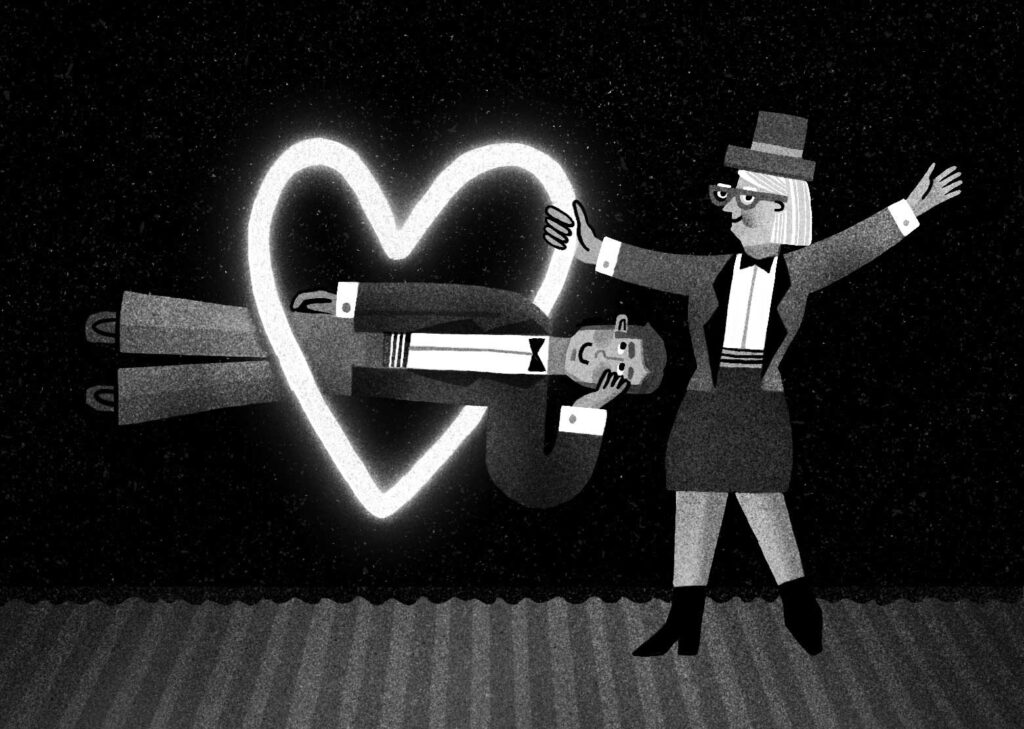Readers of Richard Kelly Kemick’s eccentric, wide-ranging debut story collection may find themselves torn between admiration and agitation. What unites the eleven tales in Hello, Horse, rather than a genre, a location, or a set of characters, is an attitude: smirking cynicism. While Kemick’s tonal through line offers sharp wit and perceptive commentary on the absurdities of life, it can also come at the expense of his characters’ interiority.
From frigid Yellowknife to pastoral Prince Albert and onward to urban Tallahassee — where the “uncountable streetlights glowed like all of heaven’s haloes”— angsty teens and ice fishermen and racetrack gamblers encounter scenarios both realistic (political scandals and teen pregnancies) and surreal (dystopian futures and talking dogs). Behind many of Kemick’s stories lies a postmodern sense of ironic detachment, a mordant humour that sometimes pairs uneasily with his earnest insights into the human condition.

A magician’s assistant becomes romantically entangled with his much older boss.
Sandi Falconer
The collection’s best offerings downplay the caustic posturing and embrace those insights sincerely. The titular entry — which won the Writers’ Guild of Alberta’s Howard O’Hagan Award in 2019 — centres on Jeremy, a self-hating gay high school student, and his classmate Millicent, the tale’s narrator, who longs to leave their unspecified small town for cosmopolitan Vancouver. While taking a nighttime stroll, they round a corner and find themselves nearly trampled by a wild stallion: “At the last moment, he peels to my left and stampedes past, so close that if I wanted, I could reach out and graze my hand along his flank.” Kemick expertly handles this symbolism. Both human characters long for freedom — from rural conservatism, their insecurities, and their emotional burdens — but also fear the loneliness that may accompany it. In its wildness, the horse might be “as majestic as a stray dog,” but it is also out of place in this environment. The animal will surely face difficulties while exercising its natural, untamed energy, just as Jeremy might for exploring his sexuality and Millicent will if she leaves home.
Another highlight, “Gravity,” follows two young delinquents and long-time friends, Patrick and Danny, who have been hired by their town’s unscrupulous mayor to deface signs promoting his political opponent. Deeply affected by his mother’s death by suicide years earlier, Patrick has grown increasingly reckless. That incautiousness comes to a head when, speeding and not watching the road, he runs over his own dog. Weeping and cradling his dead pet, Patrick refuses to release his grasp. The story concludes with Danny, who has a pregnant girlfriend at home, walking away. Again, the symbolism is profound: Danny realizes that he cannot carry Patrick’s burdens indefinitely, especially as he prepares for the responsibilities of fatherhood. We can’t always make sense of life’s absurdities, like death, but they can remind us of our essential finitude and our need to push forward for the good of others (and ourselves).
Other entries lack such substance. In “Our Overland Offensive to the Sea,” prisoners are condemned to re-enact the Canadian “civil war” for voyeuristic audiences. They die repeatedly but are resurrected as ghosts to perform the carnage again and again. The repetition of violence for entertainment in a futuristic context is intriguing, but the lack of nuanced exploration leaves the story hollow. Rather than offer social commentary or memorable imagery, it almost comes across as a plot-driven sci‑fi thriller, like Stephen King’s The Running Man. In “The Great and the Gone,” a thirty-four-year-old magician’s assistant becomes romantically entangled with his boss, an illusionist some twenty years his senior. He discovers she’s been hiding a daughter the same age as him, but rather than react angrily, he realizes that intimacy is its own kind of “magic” that rests on mystery: “Nobody loves the trick they understand.” Well put, perhaps, but the familiar notion that love exceeds intellectual comprehension is far from a revelatory climax.
More innovative is the joy that Kemick seems to take in juxtaposing the grotesque with the comical. Consider a father whose limb gets amputated by a rock saw with a blade so hot that it instantly cauterizes the wound. “An arm’s lopped onto the dirt and the shoulder socket’s a dead-end,” Kemick gleefully describes, quickly adding the macabre remark that “everything had been burned closed and probably smelled like hamburger.” During a pitched battle, a wounded sergeant “holds his own lung and whinnies a shrivelling scream,” while another soldier breezily strides in, having “spent all day sipping cola in Colonel Jared’s air-conditioned RV.” Kemick’s unique voice shines with these moments of tonal whiplash. By using dark humour to sharpen the impact of otherwise grim scenarios, he traverses the extremes of slapstick comedy and gory tragedy.
With its ambitious diversity, deep metaphor, and provocative prose, there’s much to recommend in Hello, Horse. Although Kemick’s work is uneven, his best stories display genuine emotional power. Hello, Horse may disappoint those seeking a spit-shined narrative, an altogether smooth experience with no sharp edges. But readers open to a first collection from an energetic, talented writer willing to take risks, even if they don’t all pan out, will be well rewarded.
Alexander Sallas can now collect his frequent flyer miles as Dr. Sallas.

